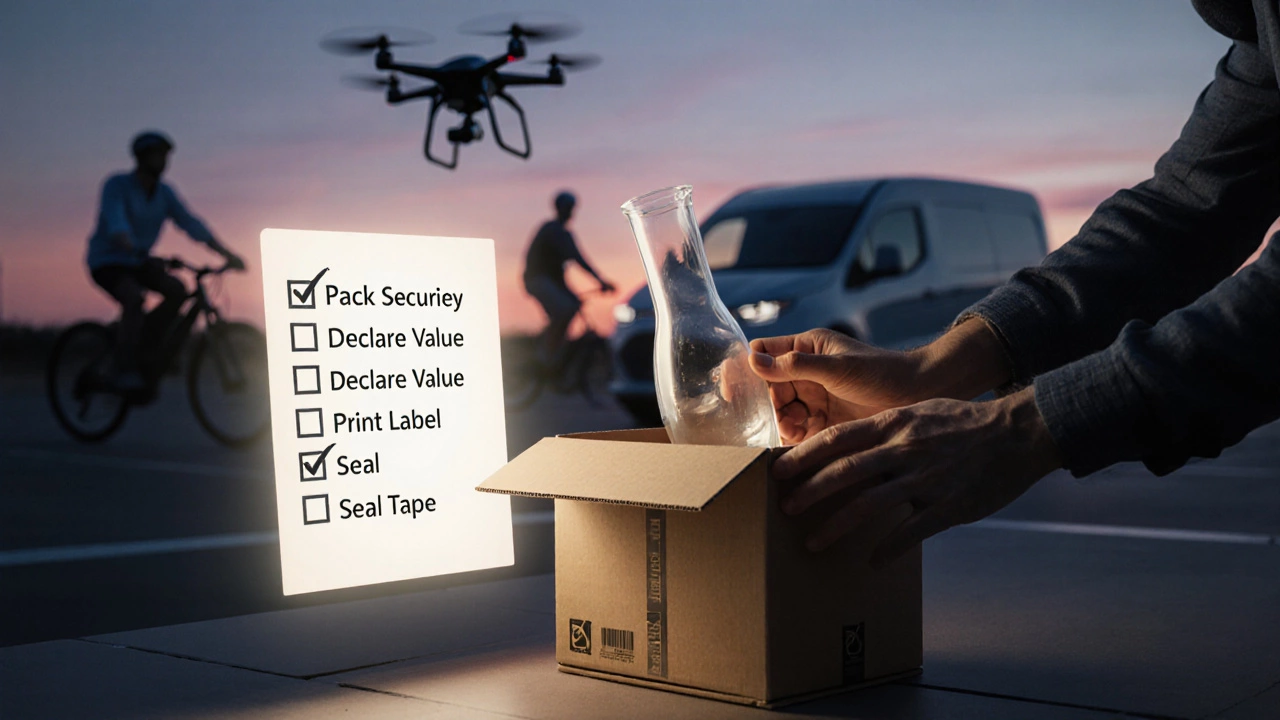Courier Cost Calculator
Includes:
- Pickup and delivery
- Real-time tracking
- Signature confirmation
- Base insurance ($100-$500)
When you ship a package via courier, you’re not just paying to move a box from point A to point B. You’re buying a system - one that handles everything from pickup to proof of delivery. But what exactly does a courier include? Many people assume it’s just transportation. That’s not true. Modern courier services bundle a lot more than most customers realize.
What’s Actually Inside a Courier Service?
A courier isn’t just a driver with a van. It’s a chain of processes designed to get your item there safely, on time, and with visibility. At minimum, a standard courier service includes:
- Pickup from your address or drop-off point
- Secure packaging or repackaging if needed
- Tracking number and real-time updates
- Transportation via road, air, or mixed mode
- Delivery to the recipient’s door or designated location
- Signature confirmation or digital proof of delivery
- Insurance coverage up to a standard limit (usually $100-$500)
These aren’t optional extras. They’re built into the base price of most major couriers like FedEx, DHL, NZ Post, or local providers like TOLL or CourierPost in New Zealand. If you’re paying for a courier, you’re already getting this core package.
Tracking: More Than Just a Number
Tracking isn’t just a fancy feature - it’s a requirement. Every courier package comes with a unique barcode that’s scanned at every stage: when it’s picked up, sorted at a depot, loaded onto a truck, and finally delivered. These scans update the tracking page in real time.
Why does this matter? Because without tracking, you have no way to know if your package is stuck in a warehouse, delayed at customs, or accidentally sent to the wrong city. In 2025, even small local couriers in Auckland use automated scanning systems. If your courier doesn’t offer tracking, it’s not a professional service - it’s a gamble.
Insurance: What’s Covered and What’s Not
Most couriers include basic insurance - but it’s not what you think. Standard coverage usually caps at $100 for domestic shipments and $500 for international. That means if you send a $2,000 laptop and it gets lost, you’ll only get $500 back unless you pay extra.
High-value items like electronics, jewelry, or artwork require declared value coverage. This costs extra - often 1% to 3% of the item’s value - but it’s worth it. In New Zealand, NZ Post and DHL allow you to declare values up to $10,000. Some couriers even offer full replacement value if you pay for premium insurance.
Remember: insurance only covers loss or damage during transit. It doesn’t cover delays, wrong addresses, or items packed poorly by the sender. If you wrap your glass vase in a newspaper and ship it, don’t blame the courier if it breaks.
Pickup and Delivery Options
Couriers don’t just deliver to your front door. They offer multiple options:
- Residential delivery: Standard to your home, often between 9 a.m. and 6 p.m.
- Business delivery: Weekday daytime drops, sometimes with signature required.
- Day-specific delivery: Choose Monday, Wednesday, or Friday - extra cost applies.
- Time-window delivery: Get your package between 10 a.m. and 12 p.m. - only available with premium services.
- Drop-off points: Leave it at a parcel locker, post office, or convenience store.
- Same-day delivery: Available in major cities like Auckland, Wellington, and Christchurch for urgent items.
Same-day courier services in Auckland can deliver within 4 hours if you book before 11 a.m. They use local riders on scooters or small vans, not long-haul trucks. This is common for medical samples, legal documents, or urgent retail orders.
What’s Not Included - The Hidden Gaps
Just because a courier includes a lot doesn’t mean it includes everything. Here’s what’s usually extra:
- Customs clearance: For international shipments, duties and taxes aren’t included. You pay those on delivery or prepay them.
- Special handling: Fragile, hazardous, or oversized items cost more. A pallet or a 50kg box needs a forklift - that’s not standard.
- Address correction: If the recipient’s address is wrong or incomplete, you’ll pay a fee to redirect it.
- Redelivery: If no one’s home and the driver leaves a card, you pay to get it delivered again.
- Signature waiver: If you don’t want a signature, some couriers charge extra to leave the package unattended.
These add-ons can quickly double your shipping cost. Always check the fine print before clicking "Confirm Shipment."
How Much Does a Courier Actually Cost?
Prices vary wildly based on size, weight, distance, and speed. Here’s what you can expect in New Zealand in 2025:
| Service Type | Package Size | Delivery Time | Estimated Cost (NZD) |
|---|---|---|---|
| Standard Domestic | Small (under 2kg) | 1-2 business days | $8-$15 |
| Standard Domestic | Medium (2-10kg) | 1-3 business days | $15-$35 |
| Express Domestic | Small | Next business day | $20-$40 |
| International (Australia) | Small | 2-4 days | $30-$60 |
| International (USA/UK) | Small | 5-8 days | $60-$120 |
| Same-Day (Auckland) | Small | Within 4 hours | $45-$80 |
These prices include all the core services listed earlier. The real cost comes when you add insurance, special handling, or delivery windows.
Who Uses Couriers the Most?
You might think only e-commerce sellers use couriers. But in 2025, the biggest users are:
- Small businesses: Sending invoices, contracts, or samples to clients.
- Medical labs: Transporting blood samples, test kits, or organs - often with temperature control.
- Law firms: Delivering legal documents that require proof of receipt.
- Online shoppers: Returning items, especially with free return labels.
- Manufacturers: Shipping spare parts or tools to technicians.
In Auckland, over 60% of courier pickups come from home-based businesses. The rise of remote work and side hustles has turned courier services into everyday infrastructure - not just for big companies.

How to Choose the Right Courier
Not all couriers are equal. Here’s how to pick one that fits your needs:
- Know your package: Weight, dimensions, and value matter. Measure it before you quote.
- Check delivery zones: Some couriers charge extra for rural addresses or islands.
- Compare insurance limits: If you’re shipping something valuable, don’t go with the cheapest option.
- Read reviews on delivery reliability: Look for comments about missed deliveries or damaged packages.
- Ask about returns: Can you drop off a return at a local store? Is the label free?
In New Zealand, NZ Post is the most reliable for rural areas. CourierPost is faster in cities. DHL and FedEx are best for international. For same-day, try TOLL or local riders on platforms like Airtasker or Sendle.
Common Mistakes People Make
Even experienced shippers mess up. Here are the top errors:
- Using the wrong box: A cardboard box that’s too flimsy crushes under pressure. Use double-wall boxes for anything over 5kg.
- Not sealing properly: Tape all seams. A loose flap means your package might open mid-transit.
- Writing the address wrong: Misspellings or missing apartment numbers cause delays. Print labels if you can.
- Forgetting to declare value: If you don’t declare it, you can’t claim insurance later.
- Shipping prohibited items: Batteries, aerosols, alcohol, and certain foods are banned unless properly labeled.
One Auckland-based seller lost a $300 order because they shipped it in a reused envelope. The courier’s sorting machine tore it open. No insurance covered it because the packaging wasn’t secure.
What’s Next for Courier Services?
In 2025, couriers are getting smarter. Drones are being tested for rural deliveries in the South Island. AI predicts delivery delays before they happen. Electric vans are replacing diesel trucks in Auckland’s city center.
But the biggest change? Expectation. Customers now want to know exactly when their package will arrive - down to the 15-minute window. Couriers are investing heavily in real-time tracking, app notifications, and live chat support to keep up.
What doesn’t change? The core promise: your item gets there safely, on time, and you know where it is the whole way. That’s what a courier includes - and it’s worth paying for.
Does a courier include packaging materials?
Most couriers do not include packaging materials like boxes, tape, or bubble wrap. You’re expected to provide your own secure packaging. Some courier stores sell supplies, but they charge extra. Always pack your item properly - if it arrives damaged and you used weak packaging, insurance won’t cover it.
Can I track my courier without an account?
Yes. You only need the tracking number, which the sender gives you. You can enter it on the courier’s website or use third-party trackers like 17track.net or Parcel Monitor. No login or account is required. Just make sure you have the correct number - a single typo can show no results.
What happens if my courier is late?
Most standard courier services don’t offer refunds for delays unless you paid for a guaranteed delivery window. Express services may promise a time frame, and if they miss it, you might get a partial refund. But delays caused by weather, customs, or wrong addresses aren’t covered. Always plan ahead - don’t rely on next-day delivery for time-sensitive events.
Is same-day courier worth the cost?
It depends on your urgency. If you’re sending a contract that needs signing today, or medical samples that expire, then yes - it’s worth it. For most people, next-day delivery is cheaper and just as reliable. Same-day is expensive because it requires dedicated drivers and immediate dispatch. Use it only when the cost of delay is higher than the shipping fee.
Do couriers deliver on weekends?
Standard couriers in New Zealand don’t deliver on weekends. However, some premium services like DHL Express or local same-day providers offer Saturday delivery for an extra fee. Sunday delivery is rare and usually only for medical or emergency shipments. Always check the courier’s schedule before you ship.
Can I send food or perishables via courier?
Yes, but only with special handling. Most couriers allow perishables if they’re packed with ice packs in insulated containers and shipped via express service. Some, like NZ Post, won’t accept fresh meat or dairy. Always check the courier’s restricted items list. If you’re shipping internationally, customs rules apply - many countries ban food imports without permits.
What’s the difference between a courier and a postal service?
Couriers are private companies focused on speed, tracking, and reliability. Postal services are government-run and prioritize volume over speed. Couriers give you real-time tracking, door-to-door delivery, and better customer service. Postal services are cheaper but slower and less reliable for packages. In New Zealand, NZ Post acts as both - it’s the national postal service but also offers courier-style services under CourierPost.





